You’ve probably read hundreds of times: ranking a website starts with solid keyword research.
To do this, you need a keyword research tool to understand what users are searching for and identify what they expect to find on Google.
At first glance, this doesn’t seem like a problem, there are dozens of tools available to help you find keywords on Google.
However, some of them come with high price tags that might not fit your budget. But that doesn’t mean you can’t carry out your keyword research…
In this post, we’ll show you the best free keyword research tools (plus a few that aren’t free, but are very affordable and much more powerful), so you can always approach your website’s SEO from the strongest possible starting point.

What is a keyword research tool?
A keyword research tool gives you valuable insights into related keywords and synonym terms. Keyword research tools are essential during the keyword research process — the foundation of any solid SEO strategy.
Using a keyword research tool is very simple: just type in the keyword you’re interested in, and the tool will return a list of keyword suggestions based on that input.
Don’t underestimate the power of the keyword research tools.
Why do we say this?
Very easy. Because sometimes we believe we know our niche and our potential readers, users, or customers perfectly — until we get surprised by what these tools reveal.
You might think a keyword is highly searched simply because it sounds popular… and then discover it barely gets any traffic. Or the opposite: you come across high-potential keywords your competitors aren’t targeting.
When it comes to keyword research, relying on intuition or guesswork is not a good idea.
It should be a careful, data-driven, professional process.
That’s why your SEO strategy should always include a reliable keyword research tool to guide your work.
What tools do I recommend for finding keywords on Google?
As we’ve mentioned, there are plenty of keyword research tools available online. But it’s important to make sure you’re using reliable tools that provide accurate data — your website’s success depends on it.
Choosing the wrong tool can cost you both time and money.
If you want to search (and actually find) keywords on Google, keep reading to discover which tools we recommend and why.
DinoRANK: the solution for keyword research + AI
DinoRANK isn’t a free tool, but it doesn’t come with the high price tags of platforms like KeywordTool.io or Answer The Public either.
Its keyword research module displays valuable data like the one shown on screen, including a search trend graph that helps you detect potential seasonality.
What makes DinoRANK stand out?
For a lower price than most keyword research tools, you get not only this functionality, but a whole suite of SEO features to manage your website’s SEO from a single platform.
You will find modules for link building, SEO audits, internal linking, semantic prominence, keyword cannibalization and AI content generation, but one of the most powerful is the Position Tracking module, one of the most advanced features of DinoRANK.
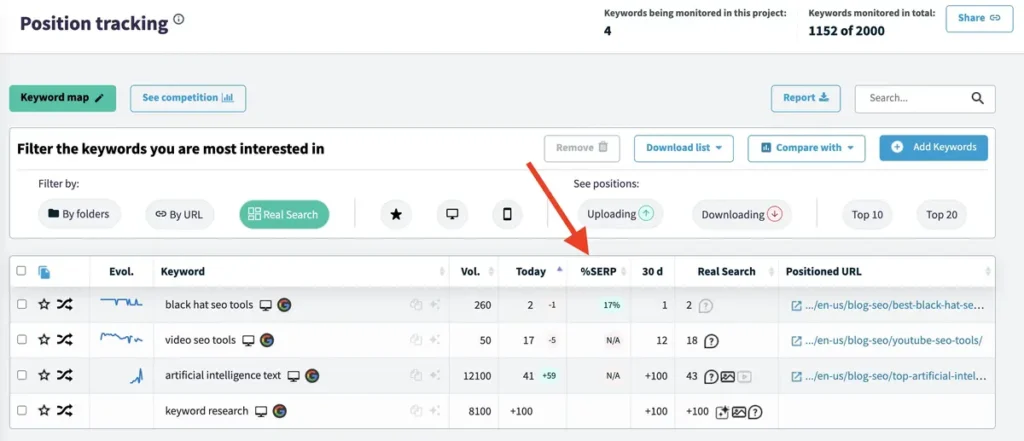
It allows you to monitor all your target keywords in detail, even knowing the visibility of your keywords with respect to AI Overviews.
In fact, the keyword research module connects directly to the tracking, so you can add keywords with just a couple of clicks.
In addition, you can now get keyword recommendations, just by adding a seed or initial keyword, and the DinoRANK IA offers you recommendations of other related keywords that may have higher search volume.
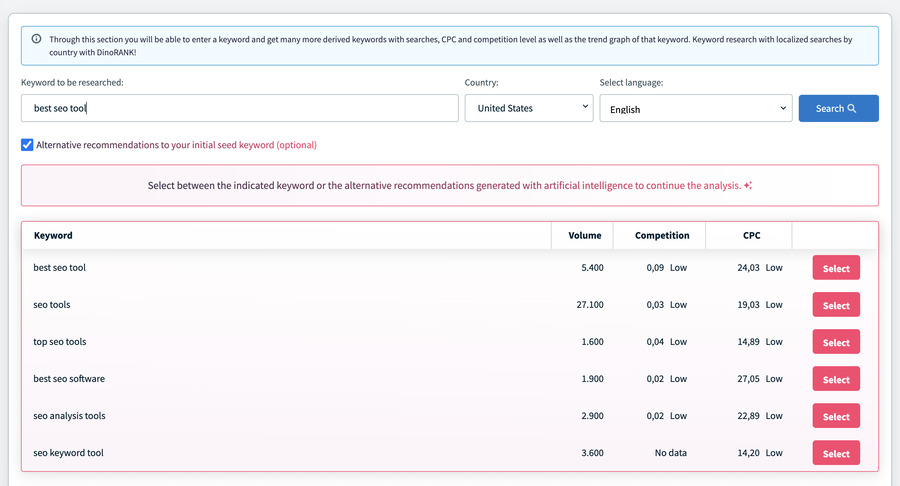
Another good job that DinoRANK has done with its keyword research module is that in a conversational way, you can have a chat with its AI so that, based on some good ideas, the tool itself gives you keyword recommendations on which to focus your content.
You can see an example here:
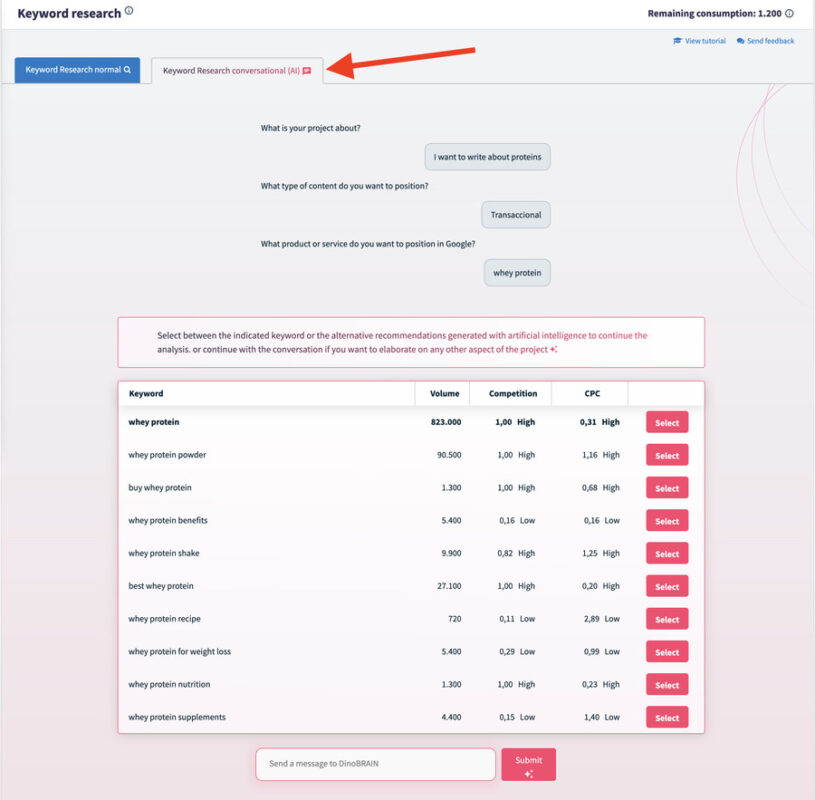
One of the key advantages of DinoRANK is its ease of use. It is designed so that technical complexity is not a barrier to doing great SEO work.
Plus, it includes an AI writer that can generate long-form, original and fully optimized SEO content from any keyword you provide. All with a single click and in 1-2 minutes.
So, with DinoRANK, you not only get a solid keyword research tool, but also the ability to instantly create optimized content for the keywords you want to rank for.
How to find keywords on Google using Google Trends
Google Trends is one of Google’s own free keyword research tools, making it a great starting point when exploring search trends.

It’s mostly used to detect trending topics and keyword seasonality, but it also provides a list of related topics and search queries, as shown in the example below.
One of the most useful features in Google Trends is the ability to filter results to highlight keywords that are growing in popularity, helping you spot rising opportunities in real time.
You can also analyze search trends by country or region, which is especially helpful if you’re working on local SEO.
For instance, if you search for “women’s shoes,” Google Trends will display a search interest graph, along with two columns: related topics on the left and related queries on the right.
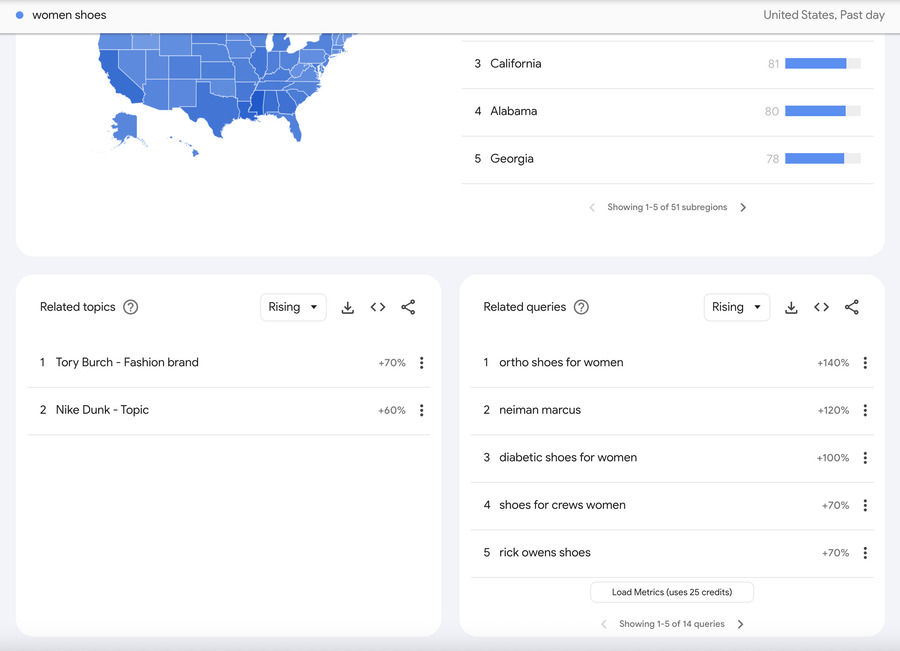
The related queries are keywords connected to your original term that are seeing a spike in search volume.
Just like with any keyword tool, you can take these related terms and explore them further to find even more opportunities.
However, Google Trends won’t give you in-depth keyword data — so if you want to dig deeper without bouncing between multiple tools, you’ll need a more complete solution like DinoRANK to streamline your keyword research and save valuable time.
Ubersuggest
Ubersuggest is one of the most well-known free keyword tools available. It belongs to Neil Patel, a marketing expert who offers this tool with both free and paid options.
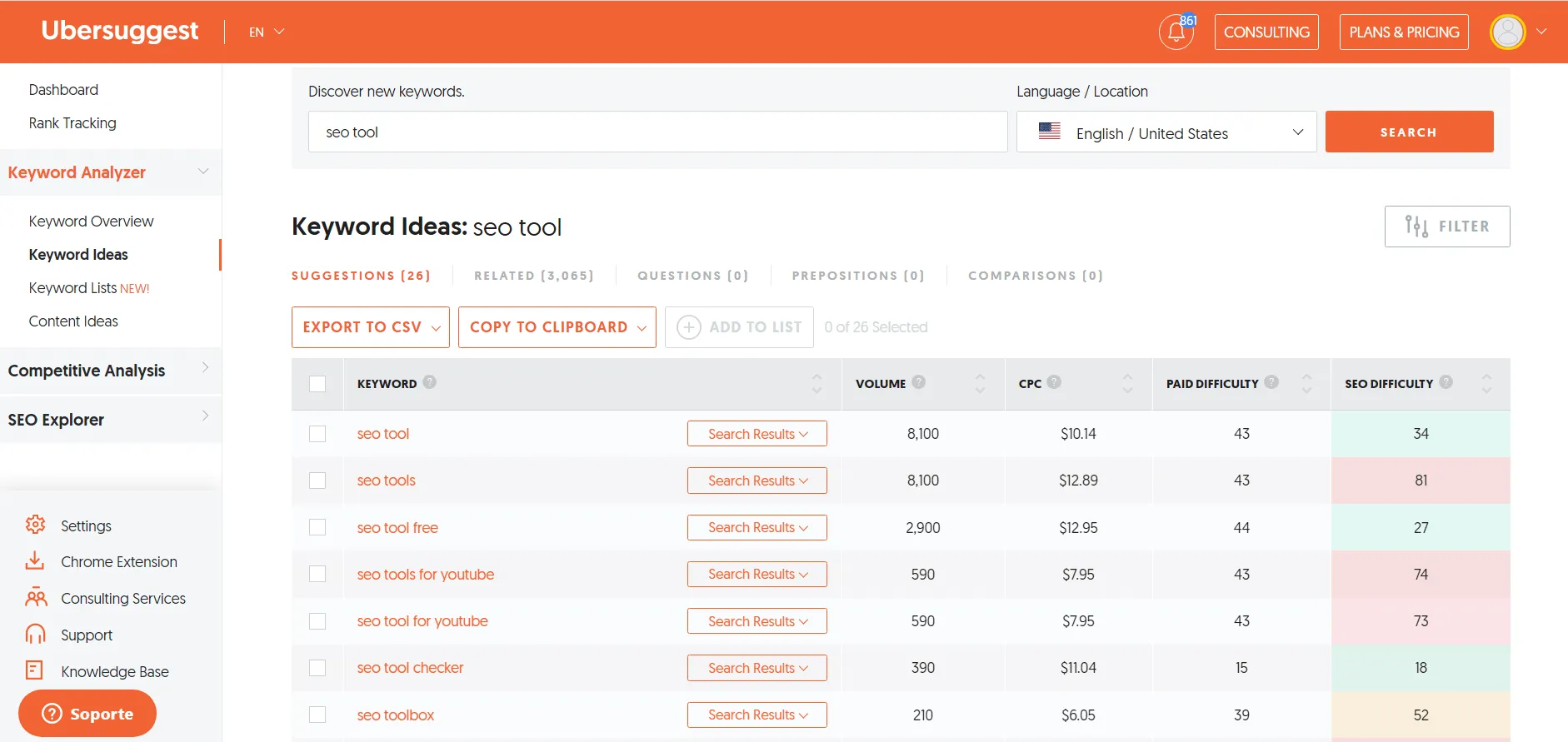
The free version of Ubersuggest lets you enter a keyword and instantly see keyword suggestions, search volume, CPC, and SEO difficulty scores. It also provides ideas for content already ranking for that keyword in Google.
Keep in mind that the free plan limits the number of daily searches and the number of results you can view. Even so, it’s still a great way to begin exploring your niche and understanding what your audience is searching for.
It also offers domain analysis, traffic estimates, backlink data, and more, but with some restrictions unless you subscribe to a paid plan.
Answer The Public
Answer The Public is another popular tool among SEOs and content creators.
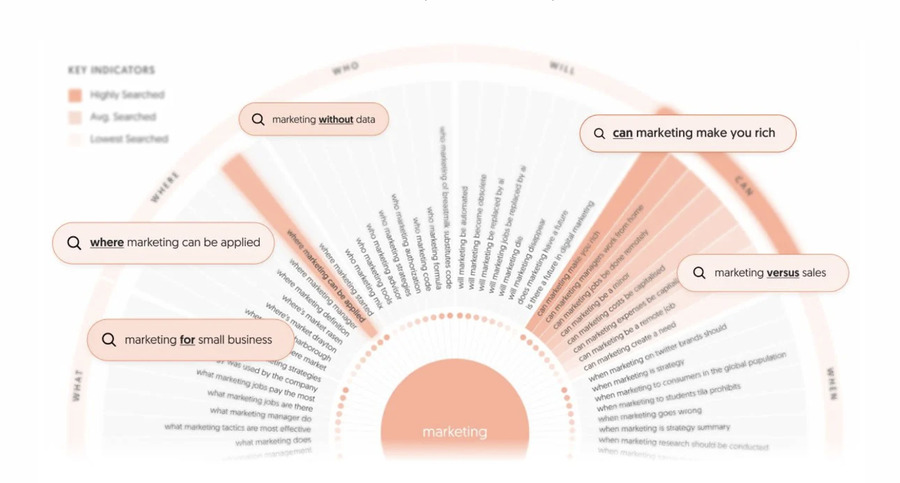
Unlike traditional keyword research tools, this one focuses on generating content ideas based on real user queries.
Simply type a keyword, and the tool will return dozens of related questions people are asking in Google—usually formatted as “what,” “how,” “when,” and other query types.
This can be especially helpful if you’re creating blog content, FAQs, or looking to optimize for featured snippets.
The downside is that the free version only allows a few searches per day, so you’ll need to use it strategically or consider upgrading to access more queries and data.
AlsoAsked
AlsoAsked is a great alternative to Answer The Public.
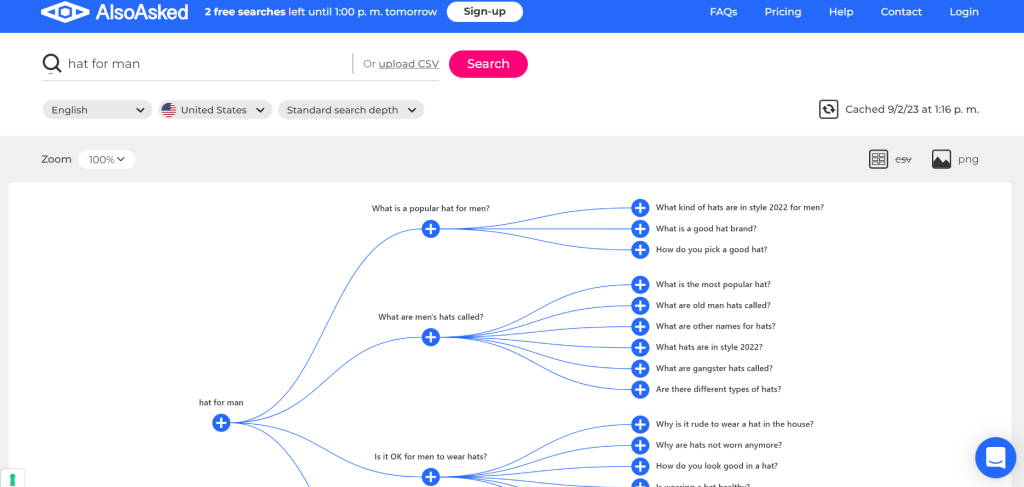
It pulls data from Google’s “People Also Ask” feature and organizes it visually, helping you understand how questions are connected semantically.
Just enter a keyword, and the tool displays a branching tree of related questions based on real user behavior. This makes it easy to build content that aligns with search intent and answers multiple related queries.
However, the free version is quite limited—you only get a few searches per month. For expanded access, you’ll need a paid plan.
Use it when you’re looking to create in-depth topic clusters or pillar content around a main keyword.
Keyword Surfer
Keyword Surfer is a free Chrome extension that shows keyword data directly inside Google’s search results page.
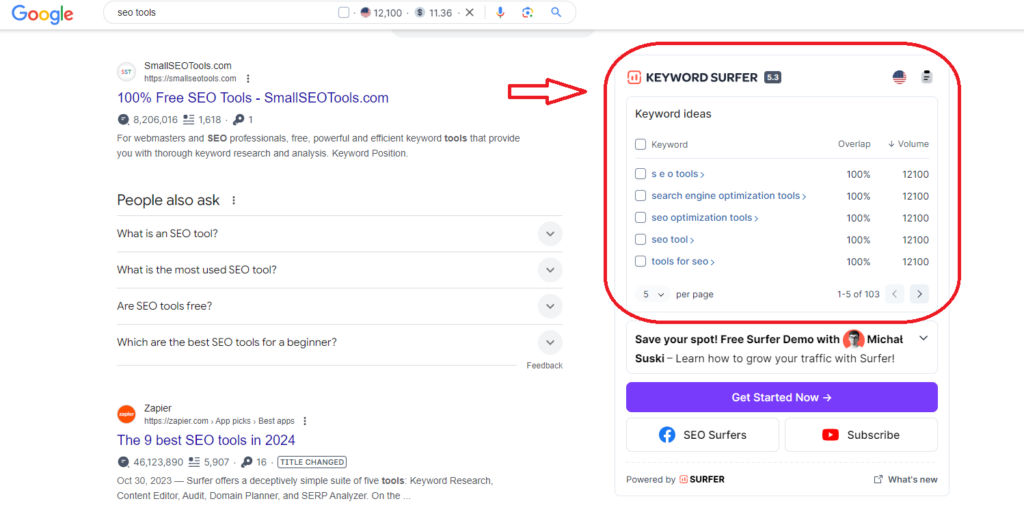
When you search for a term, you’ll instantly see estimated search volumes, CPCs, and keyword ideas in a side panel—plus SEO metrics for each URL in the SERPs.
This is especially useful for quick research without having to leave the Google results page or open a separate tool.
Keyword Surfer also displays the word count and number of exact keyword matches for top-ranking pages, helping you estimate content length and on-page optimization levels.
It’s not as in-depth as a premium SEO suite, but for a free extension, it delivers powerful insights right where you need them.
Keyword Sheeter
Keyword Sheeter is the rebranded version of the well-known Keyword Shitter. It’s a fast and free tool that helps you generate hundreds of keyword ideas in seconds.
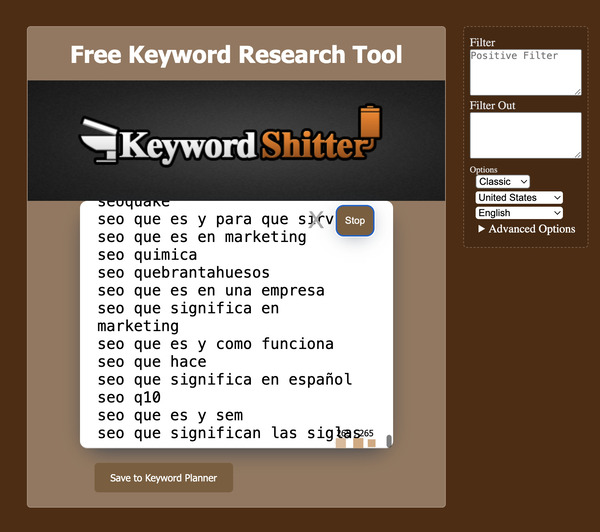
You can choose different search types—Google, YouTube, products, news, images, or books—based on the kind of content you’re planning to create.
While the tool doesn’t offer detailed SEO metrics like search volume or CPC in the free version, it’s great for quickly identifying long-tail keywords and brainstorming content ideas.
To access additional data like SERP analysis, backlinks, and CPC, you’ll need to purchase premium add-ons.
Google Suggest
Another free Google tool that we propose is precisely Google Suggest or Autocomplete. That’s, the suggestions of related keywords that the search engine itself makes when we enter a term.
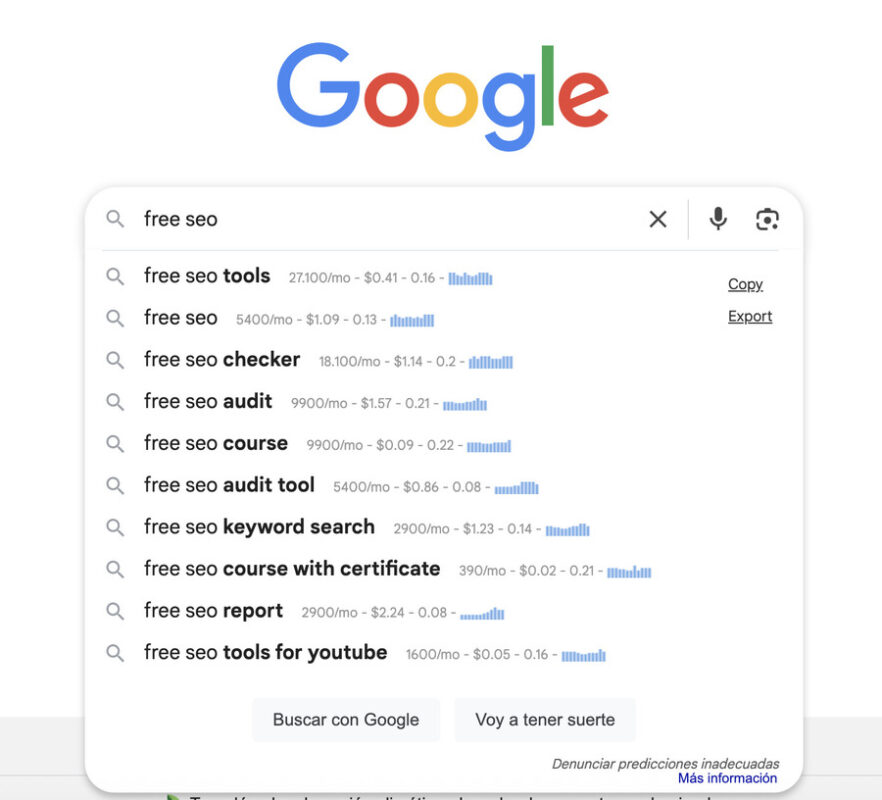
In fact, many keyword search engines take their data directly from this tool since the information comes directly from what users search for on Google: keywords with the highest number of searches, most searched topics…
However, Google Suggest also takes into account other factors such as geolocation or browsing history so, if you use it, it is preferable that you use the incognito mode so that the results are not “contaminated”.
Google Search Console
While it’s true that Google Search Console doesn’t have a keyword research tool per se, you can still use it to identify which keywords are driving traffic to your website, and which ones you might not be taking full advantage of.
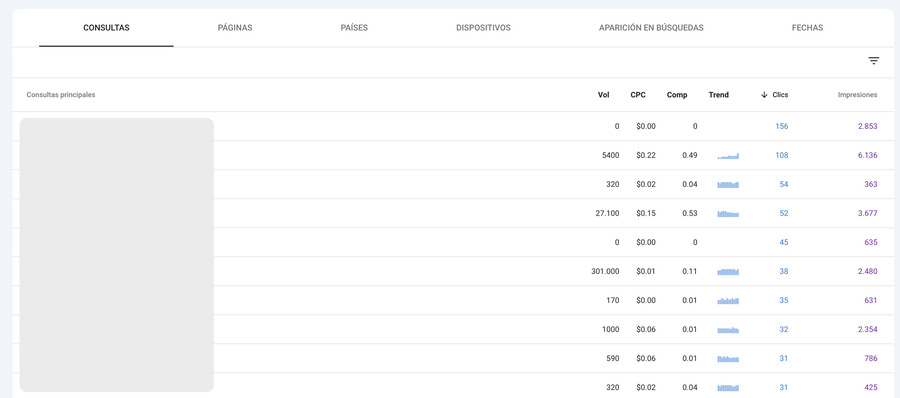
To do this, just click on Performance, and below the graph, you’ll find a list of search queries your site appears for in Google, along with the number of impressions (how often you show up in the SERPs for that keyword) and clicks.
This allows you to find new ranking opportunities—keywords you could focus on and create content around to attract even more traffic.
Other tools also offer this feature with more detailed insights, such as DinoRANK and its Organic Traffic module.

Conclusion: Best Free SEO Tools to start your strategy
There are plenty of free and paid keyword research tools out there, so you can choose the one that best fits your workflow—or even your specific needs at any given moment.
Some of these tools are great for quick, one-off searches. Others are more suitable for in-depth research where you need specific data like CPC or search volume.
And then there are options like DinoRANK that, for a very low cost, give you all the insights you need to run a solid keyword research process—saving you a lot of time by not having to rely on different tools for each task.
We encourage you to try a few of them out and share your thoughts in the comments!

